The recent tragic passing of fitness enthusiast and bodybuilder Joe Linder has sparked discussions and debates surrounding the potential causes of his untimely demise. In the aftermath of this unfortunate event, it is crucial to address the misconceptions and urge the public to exercise caution when attributing causation based solely on correlation. This article aims to shed light on the importance of differentiating between correlation and causation, while emphasizing the significance of focusing on personal health and well-being.
One of the critical aspects often overlooked in discussions like these is the difference between correlation and causation. While two events may occur simultaneously or appear to be connected, it does not automatically imply a cause-and-effect relationship. Correlation is a statistical measure indicating a relationship between two variables, but it does not prove that one variable directly caused the other. It is vital to approach such discussions with caution and refrain from making hasty assumptions or drawing premature conclusions.
In the case of Joe Linder’s passing, public discourse in the comments section of various platforms quickly turned to two factors: performance-enhancing drugs (PEDs) and COVID-19 vaccines. Many viewers referred to a podcast clip in which Joe discussed his use of PEDs and his vaccination status. While it is understandable that people want to engage in discussions and seek answers, it is essential to remember that speculation without concrete evidence can be misleading and potentially harmful.
The reality is that determining the exact cause of Joe Linder’s blood clot is challenging, and it may even be impossible. The causes of blood clots can be multifactorial, with various underlying factors contributing to their development. While PEDs and vaccines could potentially play a role, it is crucial to acknowledge that the ultimate cause remains uncertain. Jumping to conclusions without adequate evidence is neither productive nor respectful to the memory of the deceased.
The intense focus on finding the cause of Joe Linder’s blood clot reflects a fear of death that many individuals harbor. It is understandable to fear mortality, especially when faced with tragic events. However, it is essential to recognize that anyone can experience health complications, including blood clots, regardless of their lifestyle choices. Comparing oneself to others or engaging in constant anxiety about potential risks only perpetuates insecurity and hinders personal growth.
Instead of fixating on the hypothetical causes of someone else’s health issues, it is more beneficial to focus on personal well-being. The passing of Joe Linder serves as a reminder to prioritize one’s health and take proactive steps towards maintaining a healthy lifestyle. It is never too late to start making positive changes, regardless of age or circumstances. Seeking professional guidance, such as working with a coach, doctor, nutritionist, or trainer, can provide valuable support and accountability in this journey.
Living in constant fear and obsessing over worst-case scenarios does not lead to a fulfilling life. Acknowledging one’s mortality is a natural part of being human, but it should not prevent individuals from living their lives to the fullest. Taking control of personal health, making informed decisions, and embracing a proactive approach can provide a sense of empowerment and reduce unnecessary anxiety.
The passing of Joe Linder is undoubtedly a tragedy, and it is understandable that people seek answers and explanations. However, it is crucial to remember that correlation does not imply causation. Engaging in responsible discussions and refraining from hasty assumptions can prevent misinformation and unnecessary fear. Instead, individuals should focus on their own well-being, taking positive steps to improve their health and finding happiness in the present moment. By embracing personal responsibility and living without fear, we can strive for a healthier and more fulfilling life.







